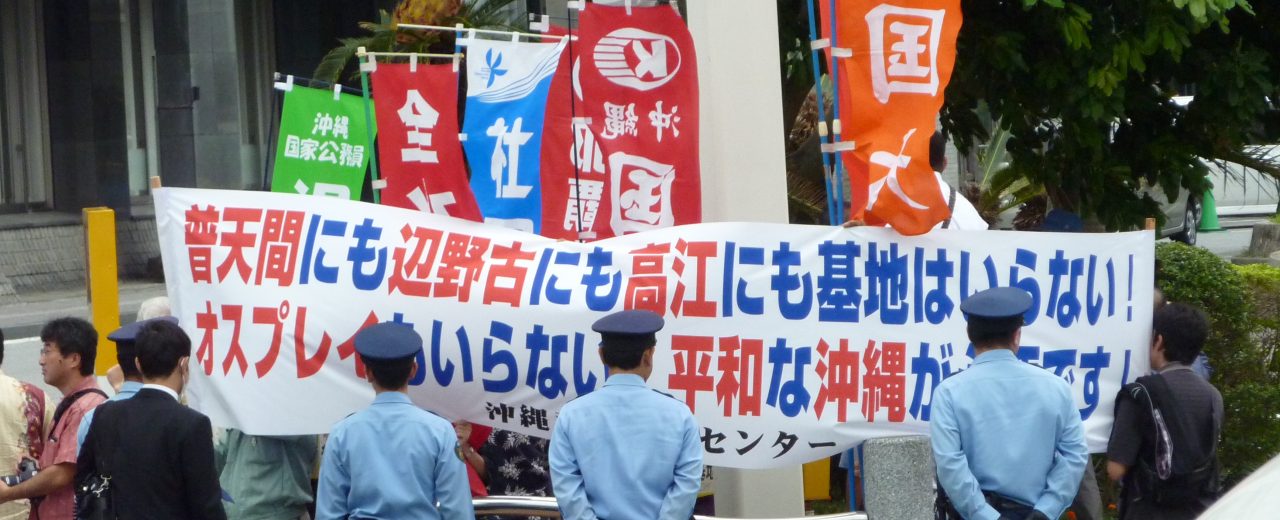For Japanese allies
GUA welcomes your participation. With the below items in mind, please take part in Okinawan movements with the knowledge that they have been cultivated generation by generation by Uchinanchu over the years.
- If you see or hear discrimination or hate speech, stand up and point out how it is problematic. Please keep in mind that it is sometimes easier for Japanese allies to speak up to other Japanese people than it is for Okinawans.
- Please study Okinawan and Japanese history to have a good understanding of the facts to help other Japanese people understand the Okinawan situation.
- Explain to fellow Japanese that Okinawa is not just an Okinawan problem. The US military base issue is part of the US-Japan Security Treaty from which all Japanese people benefit. Many US Marine bases in mainland Japan moved to Okinawa in the 1950’s as the result of protest in mainland Japan. The US military base problem is both an American and a Japanese problem.
- Please be cautious to not exclude Okinawan participation, to not compromise Okinawan autonomy in terms of either organizations or leadership, and to not misrepresent Okinawan movements or history without knowing or presenting all the facts correctly. Understand that Okinawan movements stand on the shoulders of previous generations and should honor that legacy of cultivation with Okinawan leadership.
- It is important that Japanese people speak out on Okinawan issue as a responsible party who has contributed to its base problem. However, if you find yourself in a situation where you are asked to speak or act on behalf of Okinawa, please ask yourself the following questions: “Is there an Okinawan person who can more appropriately fulfil this role? Am I allowing for the misperception that I am Japanese, and not Okinawan? Am I speaking from my own positionality?” If there are no Okinawans available to represent Okinawa, ask yourself: “What can I do to support the cultivation of Okinawan leadership?”
- Please talk or write to Japanese politicians or representatives about the Okinawan situation, and ask them to change it. First, please try to change public indifference to the Okinawan problem internal to Japan. When appealing to overseas politicians or representatives, please refer to item #5 above.
日本人の皆さんへ
GUAはあなた方の参加を歓迎します。うちなんちゅは、世代から世代へと運動を続けてきました、その事を理解した上で、下記のことに留意して沖縄の運動と関わってください。
- 沖縄差別やヘイトスピーチを見たり聞いたりした場合は、見逃さずに、それが問題を指摘する。そうした問題行動をする日本人に対しては、(差別される側の)うちなんちゅよりも、時として日本人のほうが声をあげやすく、受け入れられやすい。
- 他の日本人が沖縄の状況を理解できるよう手助けするためにも、きちんと事実をふまえた沖縄と日本の歴史を学ぶようにする。
- 沖縄の対面する問題は、沖縄だけのものではなく、日米安全保障条約に成り立つ日本の問題であり、また日米安全保障条約のもとに全ての日本国民が恩恵を被っている。現在の沖縄に存在する数多くの米軍基地が、1950年代に日本本土より移設されたものである。これらの認識を広める。
- 沖縄問題に関わる際、うちなんちゅの参加を拒んだり、組織またはリーダーシップにおける沖縄の主体性を乱したり、知識不足や不正確な事実関係を提示して沖縄の運動や歴史を誤って伝えることがないよう注意する。うちなんちゅが世代から世代へと受け継ぎ闘って来た運動を理解して、その歴史を知り、現状を理解するうちなんちゅが主導する運動の支援を心がける。
- 沖縄問題に関与してきた当事者であるからこそ、日本人が声をあげ発言することが大切である。ただし、沖縄の代弁者として発言したり、行動することを頼まれた際には、次の疑問を自身に投げかけてもらいたい。「ここにこの役割を果たせる沖縄の人がいるか」「自分自身が沖縄人ではなく日本人だという立場(ポジショナリティ)を明確にしているか」「自分自身の日本人としての立ち位置(ポジショナリティ)で発言をしているか」。もし沖縄人が沖縄を代表できない場合は、「どうしたら沖縄人のリーダーシップ育成に貢献できるか」という事を考える。
- 日本の政治家や影響力のある指導者たちに、口頭や書面で沖縄の状況を伝え、それを良い状況に変えるべく活動していくよう要請する。まず、日本における沖縄関連の問題への無関心さや世論を日本社会の内側から変える努力をする。海外の政治家や指導者たちに同様な要請をする場合は、5、の項を参照る。
